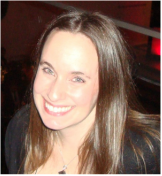Take a moment to reflect on where you are in your career right now, and think about the path you followed to get there. Why have you chosen this particular career path? Have you made deliberate, strategic choices about your career, or have your choices been reactions to external influences? What has motivated your career choices? Money? Expectations of others? Success? What’s your definition of a successful career?
Now think about your future career path. What would you like it to look like? Would it be similar to the path you’ve followed so far, or would it look completely different? Where would you like to be one year from now? Five years? Ten years? Why would you choose that career path? What about those choices are important to you?
I’ve done a lot of reflecting on my own career path, and how it looks so different than what I thought it would look like when I was younger. By the time I was eight years old, I knew I wanted to be an architect when I grew up. My most prized possession was my dad’s old drafting table, and I would spend hours and hours drawing floor plans of “dream” houses that I would daydream about living in when I grew up. I also really loved math and thought engineering would be a good career choice. So I got my degree in Architectural Engineering and began my career as a structural engineer. I envisioned myself rising up in the ranks of my chosen profession, eventually becoming the president of my own structural engineering firm. I had a well-thought-out plan, and all I had to do was follow that plan to be successful.
But you know what they say about the best-laid plans…
Looking back 20+ years later, to say I’ve followed a nonlinear career path would be an understatement. I imagine my career path might resemble a child’s drawing: a line wandering randomly all over the page, in all directions, not following any particular pattern. I’ve worked in four different professions: structural engineering, management consulting, organization development, and people strategy. I’ve worked in three different industries: construction, technology, and healthcare. Twice in my life I’ve quit my job without another job lined up, because I was feeling discontent and wanted to focus on exploring new career options. I have taken pay cuts twice. I have taken a longer time advancing to more senior roles than most people, and I’ve twice made backwards moves to less senior roles, because it was a way to get my foot in the door of a new profession. I have worked in several cities all over the world. And outside of my “day jobs,” I’ve taken on dozens of various side roles, including board member, leadership coach, writer, speaker, mentor, volunteer, tutor, and committee leader, to name some of them.
Why did I deviate so completely from my original career plan? Why have I made so many changes, and pursued so many outside projects, throughout my career? It’s not about getting bored easily or being unhappy with where I’m at. In fact, with only one exception, I haven’t left any of my jobs because I was unhappy. And it’s not about taking extreme risks. While some of my career choices may have looked risky from the outside, to me, they never felt very risky. That’s because the one common thread for me, throughout my professional life, has been following my passion. All of my career choices have been driven by passion. And I have always believed that if I follow my passion, I will succeed.
When I was a young, enthusiastic twentysomething working in structural engineering, I loved the challenge of designing complicated buildings that were both structurally sound and beautiful. While a lot of structural engineers loved to find ways to say no to architects, I loved finding creative ways to say yes: maintain the architectural vision of a building while still meeting structural codes. I became a licensed structural engineer and got very involved in the professional association for structural engineering. I was well on track to have a very successful career.
But after a few years, the engineering started to feel a bit repetitive. Structural designs were mostly slightly different variations of the same problems I’d encountered before. And the plan check process – dealing with building officials whose mission seemed to be finding fault in my designs – became more and more annoying to me. I started getting more interested in the business side of engineering. I would share frequent suggestions with my division manager on how we could improve operational efficiency, and I wanted to get more involved in strategic planning, budgeting and workforce planning. After hearing dozens of my suggestions, he exasperatedly told me, “I really just need you to be an engineer right now.” Well, that wasn’t what I wanted to hear. So, I decided to quit my job and go to business school.
I loved learning about business, and I soon realized I didn’t want to go back to engineering. I decided to go into consulting, where I’d have the opportunity to work on strategic business problems. After graduating from NYU Stern, I went to work for IBM as a management consultant. I loved the variety of consulting, getting to work on new and different projects, with new problems to solve, every few months. I also loved all of the international travel opportunities that working at IBM gave me. I worked in China for almost a year, and I made several work trips to places throughout Asia, Europe, North and South America.
After several years working as a consultant, I had learned that my favorite consulting projects were people projects – or human capital projects as they were commonly called. I began to realize that I wanted to shift my focus to human resources (HR). I started to explore HR career options in my spare time. But then I got assigned to a consulting project with particularly long hours and a particularly mean client, and I decided to speed up my career change. I quit my job and spent the next several months taking HR classes online, writing, speaking and networking. I started a blog, PeepsFirst.com, about putting people (employees) first. After a few months, one of my former managers from IBM reached out to me and convinced me to come back to IBM, in an organization development role.
So now I was in my 3rd profession, organization development, and I loved it. Although it paid less than consulting, the hours were more reasonable, and the work was incredibly fulfilling. I was essentially getting paid to recruit and hire talented people, and to figure out how to make work better for the employees in my organization. In addition to running some of the existing people programs, I also had the autonomy to propose and develop new people programs. One of the programs I started was a manager development program, to provide support and coaching to new IBM managers. I loved my job and planned to be there for a long time.
But once again, best-laid plans...
My job was in New York City, and I was living in Chicago. I’d alternate between working remotely from Chicago and traveling to New York a couple times a month to work in person with my team. I didn’t have kids, and I loved both cities, so this arrangement suited me perfectly. But after a few years in the job, IBM announced that employees were required to co-locate to where their teams were; no more remote work. So that meant I needed to move back to New York if I wanted to keep my job.
I love New York, and even a year prior it would have been a no-brainer to move back there. But I had recently become engaged to a wonderful man who lived and worked in Chicago. We both loved living in Chicago and didn’t want to leave. I decided I’d look for jobs in Chicago, and if I found the right job, I’d stay.
A few weeks into my job search, at a dinner, I ended up sitting next to an executive who worked at the University of Chicago. I asked him about working for UChicago, and he had very positive things to say about it, so I explored their career site and found a job posting for the Director of People Strategy at UChicago Medicine. People Strategy felt like the perfect fit for me – it would leverage my experience as a strategy and change consultant, and my experience as an HR/organization development professional. Plus, healthcare is an industry that has always excited me. Most people working in healthcare are there because they want to make a difference and help people. It’s an industry where you have all kinds of opportunities to make a positive impact on people. HR + strategy + making a positive impact? Yes, please! UChicago Medicine definitely felt like the right move for my career. I happily accepted the job offer and made the move into healthcare.
One year later, my job at UChicago Medicine has exceeded my already high expectations. I love learning about healthcare, especially being at a place that’s “at the forefront of medicine.” I love coming into work every day and connecting face-to-face with people. I love working with super smart, kind and compassionate colleagues. I love working with our leadership team to solve really interesting people strategy problems. I love that I get paid to focus on things like improving employee engagement. I love that I have more autonomy and influence than I’ve ever had in a job. A few months ago, I led an effort to help strengthen UChicago Medicine’s culture by celebrating our values: Participation, Respect, Integrity, Diversity, and Excellence. I led a team of passionate and dedicated volunteers to plan and implement UChicago Medicine’s first-ever PRIDE Values Week. The employees loved PRIDE Values Week, and it made me so happy to be able to make such a positive impact on people (and get paid for doing it!).
Turns out, this isn’t just the right job – it’s the best job I’ve ever had. One year on, I feel like I’ve already accomplished a lot – and yet I’m just getting started.
So that’s been my convoluted career journey thus far. Have I been successful? Well, that depends on your definition of success. I don’t make as much money as I perhaps could have, had I stayed on a linear career path. I’m in a less senior role as many people my age or younger. I’m also not very well recognized as an expert in my field, because I haven’t been in my current field for very long. But I am one of the happiest people I know. I’m in an industry I love, working for an organization I love, with wonderful people, where I have the opportunity every day to make a positive impact. I also have an incredibly fulfilling personal life: I have a wonderful, supportive partner, and we have a nine-month-old son, who is the most amazing human I’ve ever known. And while work-life balance can sometimes be a challenge, on most days I’m managing to do it pretty well. I would describe my definition of success as “living my most extraordinary life.” So according to my definition of success, yes, I’ve been extremely successful. And I plan to continue living my most extraordinary life for years and years to come.
I would love to hear more about your career path: how you got to where you are now…what has motivated your choices…where you’d like to go in the future. Please comment and share your career story!


 RSS Feed
RSS Feed